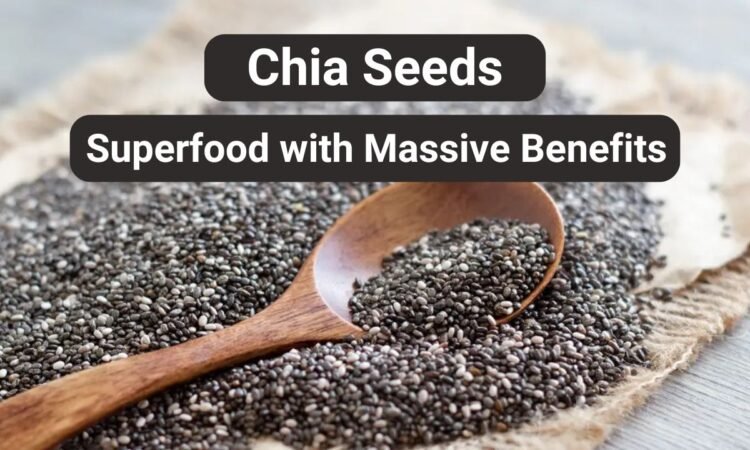In the world of superfoods, few can rival the popularity and nutritional reputation of chia seeds. These tiny black and white seeds, harvested from the Salvia hispanica plant native to Central America, have been consumed for centuries, once a staple of the Aztec and Mayan diets. In recent decades, chia seeds have made a powerful comeback in health-conscious circles worldwide. Packed with nutrients, antioxidants, and fiber, chia seeds offer a range of health benefits, making them a must-have for anyone looking to enhance their diet.
This article explores the health benefits of chia seeds, their nutritional profile, and how you can incorporate them into your daily meals.
Key Fact about Chia Seeds
| Category | Key Facts |
|---|---|
| Origin | Native to Central America, used by Aztecs & Mayans. |
| Nutritional Value (per ounce – 28g) | Fiber: 11g, Protein: 4g, Fat: 9g (5g omega-3s), Calcium: 18% RDA, Magnesium: 30% RDA, Phosphorus: 27% RDA. |
| Omega-3 Source | Rich in ALA (alpha-linolenic acid), supports heart and brain health. |
| Digestive Health | High fiber content aids digestion, promotes gut health, and prevents constipation. |
| Heart Health | Helps lower cholesterol, reduces blood pressure, and combats inflammation. |
| Blood Sugar Regulation | Slows carb digestion, prevents sugar spikes, supports insulin sensitivity. |
| Weight Management | Expands in the stomach, increases satiety, reduces appetite. |
| Bone Health | High in calcium, magnesium, and phosphorus—stronger bones, good for lactose-intolerant individuals. |
| Skin & Hair Benefits | Antioxidants and omega-3s promote healthy skin and hair. |
| Ways to Consume | Smoothies, puddings, oatmeal, yogurt, baking, salads, chia water. |
| Precautions | Consume with water to prevent choking, moderate intake due to calorie density, rare allergies possible. |
Nutritional Powerhouse in a Small Package
Despite their small size, chia seeds are incredibly nutrient-dense. Just a single ounce (about 28 grams or two tablespoons) of chia seeds contains:
- Fiber: 11 grams
- Protein: 4 grams
- Fat: 9 grams (5 of which are omega-3s)
- Calcium: 18% of the Recommended Daily Allowance (RDA)
- Magnesium: 30% of the RDA
- Phosphorus: 27% of the RDA
They also provide significant amounts of zinc, vitamin B1 (thiamine), B2 (riboflavin), and potassium. Best of all, they are low in calories — around 137 per ounce — and are naturally gluten-free.
ALSO READ | 10 Proven Health Benefits of Chia Seeds for a Stronger Heart
Rich Source of Omega-3 Fatty Acids
One of the key benefits of chia seeds is their high content of alpha-linolenic acid (ALA), a plant-based omega-3 fatty acid. Omega-3s are known to reduce inflammation, improve brain health, and lower the risk of chronic diseases like heart disease. While ALA is not as powerful as the omega-3s found in fish (EPA and DHA), it is still an important source for vegetarians and vegans.
Research suggests that a diet high in omega-3s can support heart health by lowering bad cholesterol (LDL), reducing blood pressure, and preventing blood clots.
Excellent for Digestive Health
Chia seeds are packed with dietary fiber, which is essential for maintaining a healthy digestive system. The soluble fiber in chia seeds absorbs large amounts of water and expands in the stomach, which can increase feelings of fullness and reduce appetite — a valuable benefit for those trying to lose or maintain weight.
Fiber also aids in regular bowel movements, prevents constipation, and supports the growth of healthy gut bacteria, contributing to overall gut health.
Supports Heart Health
Chia seeds support heart health in several ways. Their high levels of fiber, omega-3 fatty acids, and antioxidants all contribute to lower cholesterol levels and reduced blood pressure. The antioxidants in chia seeds help combat oxidative stress and inflammation, both of which are risk factors for heart disease.
Several studies have shown that regular consumption of chia seeds can lead to improved cardiovascular markers. However, more large-scale human studies are needed to confirm these effects conclusively.
Helps Regulate Blood Sugar Levels
Maintaining stable blood sugar levels is crucial for long-term health and particularly important for individuals with diabetes or insulin resistance. Chia seeds can slow down the digestion of carbohydrates due to their high fiber content and gel-like consistency when soaked.
This slow digestion results in a gradual release of sugar into the bloodstream, preventing spikes in blood sugar. A few studies have indicated that chia seeds may reduce blood sugar spikes after meals and improve insulin sensitivity.
Aiding in Weight Loss and Satiety
Chia seeds have become a go-to food for people aiming to manage their weight. Thanks to their high fiber and protein content, they promote a feeling of fullness that may reduce overall calorie intake.
When soaked in water or another liquid, chia seeds form a gel-like substance that expands in the stomach, helping to curb hunger and reduce cravings. Adding chia seeds to breakfast, such as in smoothies, oatmeal, or yogurt, can help reduce snacking later in the day.
Bone Health Booster
Chia seeds are an excellent source of several nutrients important for bone health, including calcium, phosphorus, magnesium, and protein. Gram for gram, chia seeds contain more calcium than most dairy products, making them an excellent choice for individuals who are lactose intolerant or follow a plant-based diet.
One ounce of chia seeds contains 18% of the RDA for calcium, making them a powerful ally in maintaining strong bones and preventing osteoporosis.
Improves Skin and Hair Health
The antioxidant and anti-inflammatory properties of chia seeds also extend to skin and hair health. The omega-3s help maintain skin moisture and elasticity, while the antioxidants fight off free radicals that cause premature aging. Regular consumption of chia seeds can promote glowing skin and healthier hair.
In some cases, chia seeds are even used topically in DIY face masks or hair packs, although their primary benefits come from internal consumption.
Easy to Incorporate Into Your Diet
Chia seeds are incredibly versatile. They have a mild, nutty flavor that blends easily into both sweet and savory dishes. Here are a few simple ways to add chia seeds to your meals:
- Smoothies: Blend chia seeds into your morning smoothie for added fiber and protein.
- Puddings: Soak them overnight in milk or plant-based milk to make chia pudding. Add fruits, nuts, and honey for taste.
- Oatmeal and Yogurt: Sprinkle them over oatmeal or yogurt.
- Baking: Add them to muffins, cookies, or bread for a nutritional boost.
- Salads and Stir-Fries: Sprinkle raw seeds over salads or mix into stir-fries.
- Chia Water or Juice: Add them to water with lemon or to fresh juice for a hydrating energy drink.
There’s no need to grind them, unlike flaxseeds — chia seeds can be eaten whole or soaked.
Precautions and Considerations
While chia seeds are generally safe for most people, there are a few things to keep in mind:
- Hydration: Because chia seeds absorb a large amount of liquid, they should be consumed with adequate water. Eating dry chia seeds and then drinking little water can cause digestive discomfort or even a choking hazard in rare cases.
- Portion Control: Despite their health benefits, they are calorie-dense. Moderation is key — one to two tablespoons per day is usually sufficient.
- Allergies: Although rare, some individuals may be allergic to chia seeds.
You Learn
Chia seeds may be small, but they are a true superfood in every sense.
- Tiny but mighty – Chia seeds are a true superfood.
- Nutrient-rich – High in fiber, protein, omega-3s, and essential micronutrients.
- Health benefits – Supports weight loss, heart health, and strong bones.
- Easy to use – Add to breakfast, smoothies, or meals effortlessly.
- Small changes, big impact – A simple way to boost overall health.
(India CSR)






















